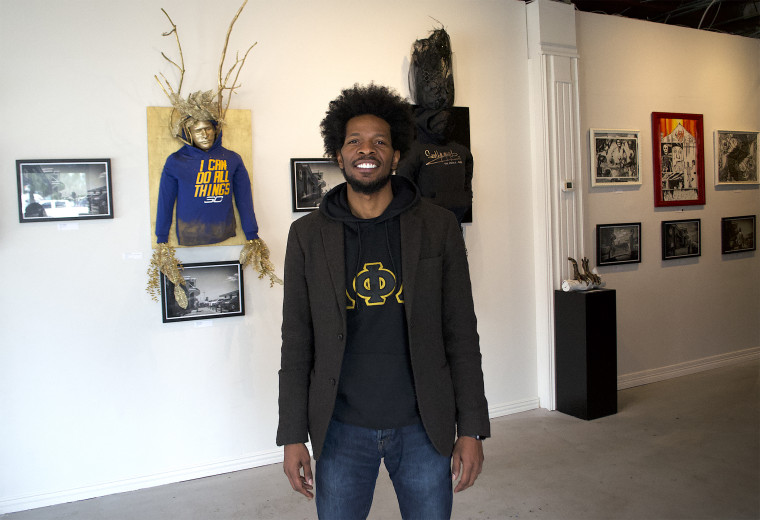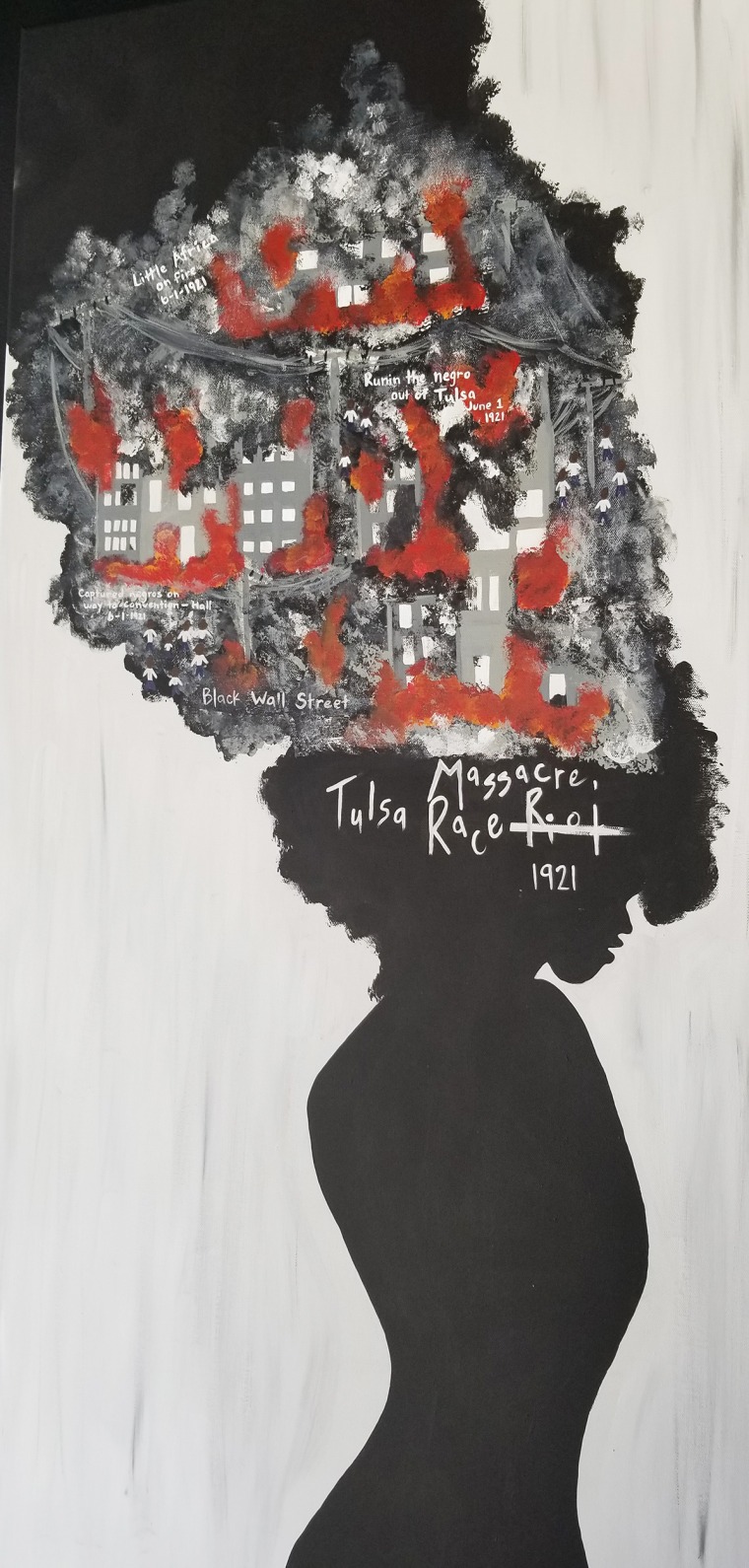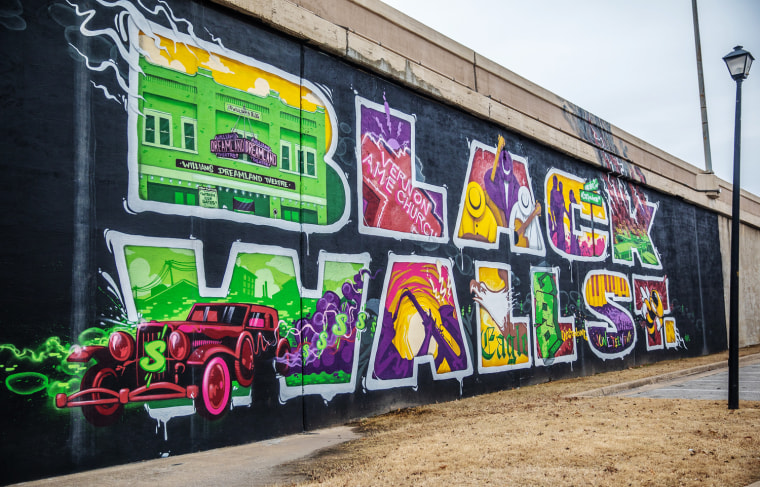TULSA, Oklahoma — “People are power!” That greeting is repeated as groups of people enter the Black Wall Street Gallery in Greenwood, Oklahoma. Those words serve not only as a message upon entering the space, but also a recognition of the communal unity that created the success of the historic Greenwood District, which was also known as Black Wall Street.
The neighborhood of Greenwood was once the center of black wealth in the United States. It was also the site of one of the worst instances of racial violence in U.S. history. In May 1921, the city’s Black Wall Street was decimated. The thriving community, which was made up of black-owned businesses, churches and homes, was bombed and burned to the ground by white mobs after a black man was accused of sexually assaulting a white woman. Thirty-five city blocks of the community were completely destroyed and it’s estimated that up to 300 people were killed. No one was ever prosecuted for the violence.
Today, the Black Wall Street Gallery is part of Black Wall Street Arts, a nonprofit endeavor that includes the new art gallery and a theater company. The idea behind the gallery, which opened last September, was to use art as a vehicle to build community and create dialogue around issues of social justice. The paintings, pictures and sculptures in the gallery are mainly the works of two local artists for “The Conciliation Series.” Each month, the gallery pairs a black artist with a white artist and features their art.
The goal of the yearlong series is to be a platform for local artists, especially black artists, to showcase their talents. Beyond that, the purpose of the exhibition is to create more positive relationships between the black and the white communities in Tulsa who have long been marred by the city’s racist past.

“I decided on the ‘Conciliation Series’ because I have a problem with the word reconciliation,” Dr. Ricco Wright, the gallery’s founder and artistic director, said. “Reconciliation in my mind is restoring friendly relations, which presupposes that we created these friendly relations in Tulsa. But I don’t know a time in our history when we’ve ever created them.”
As the centennial of the massacre approaches, the city has made efforts at reconciliation by renaming streets, some redevelopment and most recently in 2018, calls by Tulsa Mayor G.T. Bynum to reopen the investigation into whether mass graves from the violence do exist.
However, Tulsa native Wright says that while there is more acknowledgment, important factors are still missing from the conversation. It’s why he feels the focus needs to be on "conciliation" — where there is an opportunity for mediation between these two communities, as well as an apology and reparation.
As Tulsa continues to makes efforts to reconcile its past, black creatives are coming together, combining art and entrepreneurship in order to share untold stories of this community and revive Black Wall Street’s legacy of excellence.

“Black Wall Street couldn’t have happened if all those people didn’t come together with the same vision to succeed,” said Elizabeth Henley, founder of Black Moon, an artist collective in Tulsa. “And, they were just living life and being successful and growing and thriving. We can do the same.”
Henley, who was born and raised in Tulsa, says she started Black Moon last April as a means of representation. “I knew all of these creative, young, black artists but we really didn’t have venues or spaces to show our art,” she said. “So, I pulled together as many people as possible, so we would have a platform and be a force of upliftment and change.”
Her work, which often explores themes of femininity, strength and Afro-futurism, was featured in the fifth installment of the “Conciliation Series” at the Black Wall Street Gallery in January. In fact, each of the collective’s eight members, including painters, muralists and mixed-media artists will participate in the series.
“There were so many people that said they needed to see people of color and see themselves in our pieces,” Henley said. “It’s really given a lot of the artists a sense of pride in their work, but it's also given us motivation that we’re in that space and no one else can tell our stories.”
The artists see their work as a gateway to healing and their collaborative efforts as a means to increasing hope and awareness and building a community in Tulsa and beyond. “We as a collective are postured toward community and building events and projects to further engage,” Black Moon member Alexander Tamahn said. “That in and of itself is the spirit of Black Wall Street which wasn’t relegated to just the spaces on a block.”
Visual art is just one means by which people in Tulsa are building community. The songs and the annual music festival of the hip-hop collective World Culture Music are creating conversations and connections too.
“Black Wall Street was a lot of black people working together, circulating their dollars together. That’s what we do with World Culture Music,” founder Keenan Lane, whose stage name is Keeng Cut, said. In addition to performing, members of this group own and operate several small businesses. Lane takes earnings from his other business endeavors and reinvests into the work of other artists.
These black artists are dedicated to using their platforms to raise awareness, help this community heal and honor the pioneers of Black Wall Street, who laid a foundation of community wealth through collaboration.
